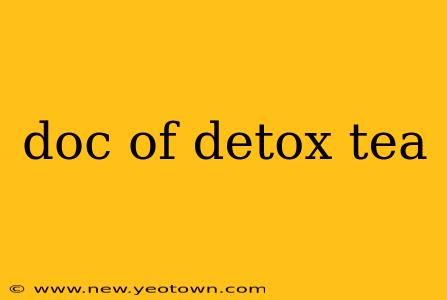The allure of a quick fix is strong, and for those seeking a rapid route to better health, detox teas often seem like the perfect solution. But what’s the reality behind these increasingly popular beverages? Are detox teas the miracle workers they're often portrayed to be, or is there more to the story? Let's dive into the world of detox teas, separating fact from fiction.
My journey into the world of detox teas began with a simple Google search, fueled by a desire to feel lighter and healthier after a particularly indulgent holiday season. I was immediately bombarded with promises of rapid weight loss, glowing skin, and improved energy levels – all within a matter of days. Intrigued, but also skeptical, I started researching. What I uncovered was a fascinating, and sometimes confusing, landscape of herbal blends, marketing claims, and scientific evidence.
What are Detox Teas?
Detox teas are typically herbal infusions marketed to cleanse the body of toxins. These teas often contain a blend of ingredients like senna, dandelion root, ginger, and lemon, each purported to have specific detoxifying properties. The core marketing strategy hinges on the idea that these teas can help the body eliminate accumulated toxins, leading to a range of purported health benefits.
Do Detox Teas Help with Weight Loss?
This is arguably the most common claim made by detox tea manufacturers. The idea is that these teas can boost metabolism and promote the elimination of waste products, leading to weight loss. However, scientific evidence supporting this claim is limited. While some ingredients in detox teas may have mild diuretic or laxative effects, leading to temporary weight loss due to water loss, this is not sustainable and doesn't reflect actual fat loss. Long-term weight loss requires a balanced diet and regular exercise.
Can Detox Teas Improve Digestion?
Some detox teas contain ingredients known to have a laxative effect, such as senna. While this might provide temporary relief from constipation, regular reliance on laxative teas can be harmful. The body can become dependent on the laxative effect, potentially leading to digestive issues in the long run. For healthy digestion, focus on a fiber-rich diet, adequate hydration, and regular exercise.
Are Detox Teas Safe?
The safety of detox teas depends largely on the ingredients and the individual's health. Some ingredients, particularly strong laxatives like senna, can cause side effects such as diarrhea, cramping, and dehydration if consumed in excess. Individuals with pre-existing health conditions should always consult a doctor before using detox teas. Pregnancy and breastfeeding are also situations where caution is particularly warranted.
What are the Potential Side Effects of Detox Teas?
As mentioned, potential side effects can include diarrhea, cramping, dehydration, and electrolyte imbalances. In some cases, severe reactions can occur, particularly for individuals with sensitivities or allergies to the ingredients. Always check the ingredient list carefully and be aware of potential interactions with medications.
What are the Best Ingredients in Detox Teas?
While the term "detox" is often misleading, some herbal ingredients found in detox teas do offer potential health benefits. Ginger, for example, has anti-inflammatory properties, while dandelion root can act as a mild diuretic. However, it's crucial to remember that these benefits are best achieved through a balanced diet and not solely through consuming detox teas.
Conclusion: A Balanced Approach to Wellness
While the allure of a quick fix is tempting, the truth about detox teas is more nuanced. While some ingredients may offer mild health benefits, the marketing claims often far exceed the scientific evidence. A balanced diet, regular exercise, and adequate hydration are far more effective and sustainable ways to improve health and well-being than relying on detox teas. If you're concerned about your health or have questions about specific ingredients, consult your doctor before using detox teas or making any significant changes to your diet. Remember, sustainable wellness is a journey, not a quick fix.

